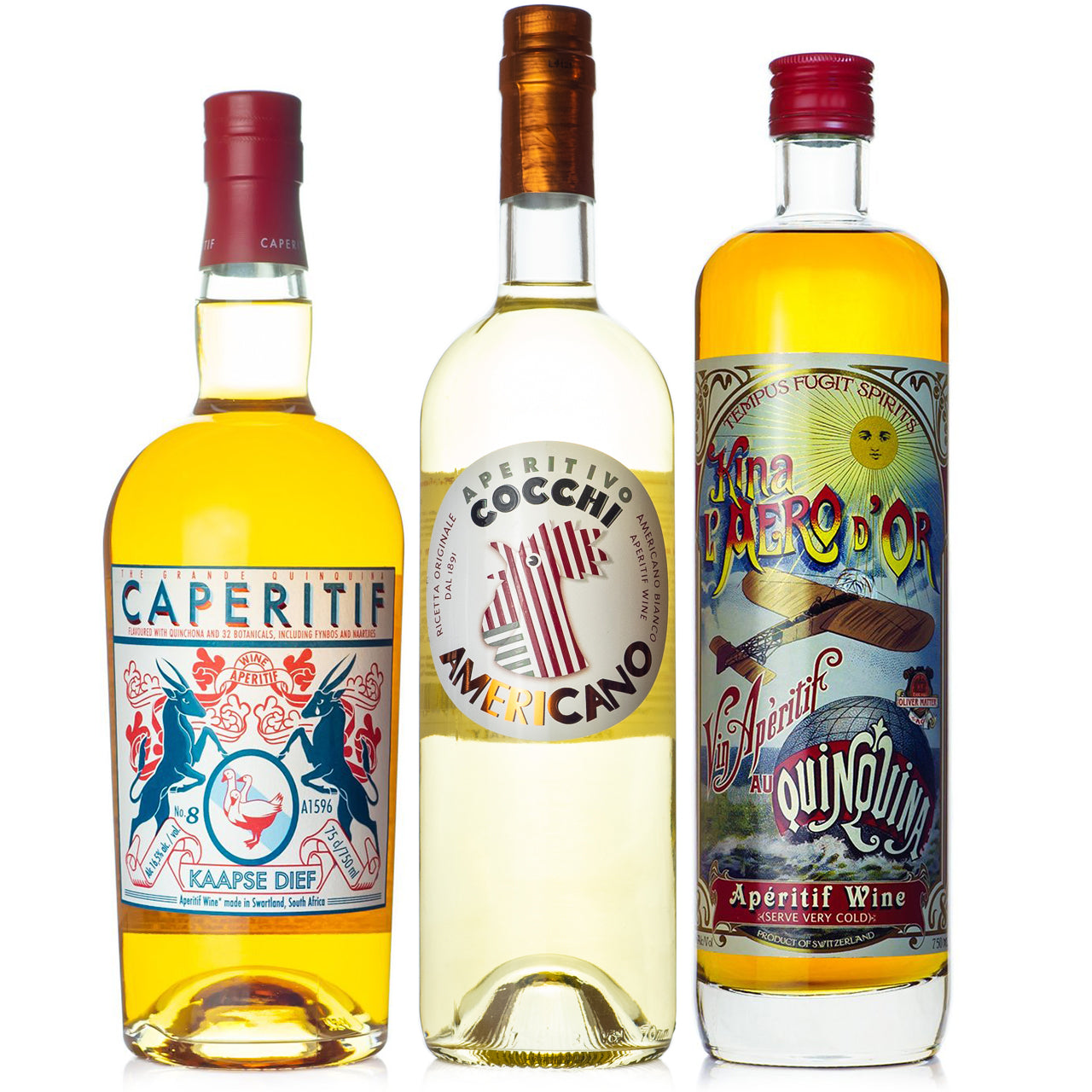
The Not Lillet Set
$90.50
Classic, with a striking label and near omnipresence in pop culture and art for over a century, a bottle of Lillet looks at least familiar to almost everyone. James Bond even called for it by name! But just like Q with an arsenal of gadgets, we've got some intriguing Lillet alternatives that James should explore. And that goes for all of us - these three globe trotting exotics aren't for secret agent palates only.
We highlight three producers from distinct parts of the globe:
Cocchi Americano: The Italian producer is no stranger to aromatized wines - Cocchi Americano has been around since the 1890s, though it's only in the last decade that it has made its way to the States. It's made from a sweeter moscato grape, and is primarily bittered by gentian rather than quinine - many a bartender swear that it is closest in flavor to the original Kina Lillet. Some of our favorite Lillet cocktails can use Cocchi Americano instead, and the deeper, herbier taste makes all the difference. (750 ml)
Kaapse Dief Caperitif Aperitif: From the A.A. Badenhorst Winery in South Africa comes Caperitif, or the Cape Aperitif. Chenin Blanc is fortified with spirit, gently sweetened by the sugar of the grapes, bittered by cinchona bark and flavored with 35 ingredients from the Cape, such as fynbos, kalmoes and naartjies. The rich floral variety of the Cape coast, including many plants that don’t occur anywhere else in the world lend their unique flavors and intriguing aromas. It drinks like a more bitter, drier and more aromatic Lillet Blanc. (750 ml)
Kina L'Aero d'Or Aperitif: Our last Lillet alternative takes us back to France, albeit to a different part. Kina L'Aéro d'Or reflects an Alps-Provence style with white wine made from the Piedmont-grown cortese grape infused with cinchona bark, orange peel, wormwood and other exotic spices. Aroma of quince and fine marmalade, and a complex, mildly bitter taste that teases the tongue as its well-balanced sweetness prolongs the finish. Spectacular in all the classic cocktails such as the Vesper or Corpse Reviver #2. (750 ml)
*It's important to note that these are alternatives, and aren't inherently better or worse than Lillet (we love that stuff!) They provide their own distinct character, more bitterness, and other unique qualities that can make them more desirable to cocktailers and sippers of all kinds.
We highlight three producers from distinct parts of the globe:
Cocchi Americano: The Italian producer is no stranger to aromatized wines - Cocchi Americano has been around since the 1890s, though it's only in the last decade that it has made its way to the States. It's made from a sweeter moscato grape, and is primarily bittered by gentian rather than quinine - many a bartender swear that it is closest in flavor to the original Kina Lillet. Some of our favorite Lillet cocktails can use Cocchi Americano instead, and the deeper, herbier taste makes all the difference. (750 ml)
Kaapse Dief Caperitif Aperitif: From the A.A. Badenhorst Winery in South Africa comes Caperitif, or the Cape Aperitif. Chenin Blanc is fortified with spirit, gently sweetened by the sugar of the grapes, bittered by cinchona bark and flavored with 35 ingredients from the Cape, such as fynbos, kalmoes and naartjies. The rich floral variety of the Cape coast, including many plants that don’t occur anywhere else in the world lend their unique flavors and intriguing aromas. It drinks like a more bitter, drier and more aromatic Lillet Blanc. (750 ml)
Kina L'Aero d'Or Aperitif: Our last Lillet alternative takes us back to France, albeit to a different part. Kina L'Aéro d'Or reflects an Alps-Provence style with white wine made from the Piedmont-grown cortese grape infused with cinchona bark, orange peel, wormwood and other exotic spices. Aroma of quince and fine marmalade, and a complex, mildly bitter taste that teases the tongue as its well-balanced sweetness prolongs the finish. Spectacular in all the classic cocktails such as the Vesper or Corpse Reviver #2. (750 ml)
*It's important to note that these are alternatives, and aren't inherently better or worse than Lillet (we love that stuff!) They provide their own distinct character, more bitterness, and other unique qualities that can make them more desirable to cocktailers and sippers of all kinds.

